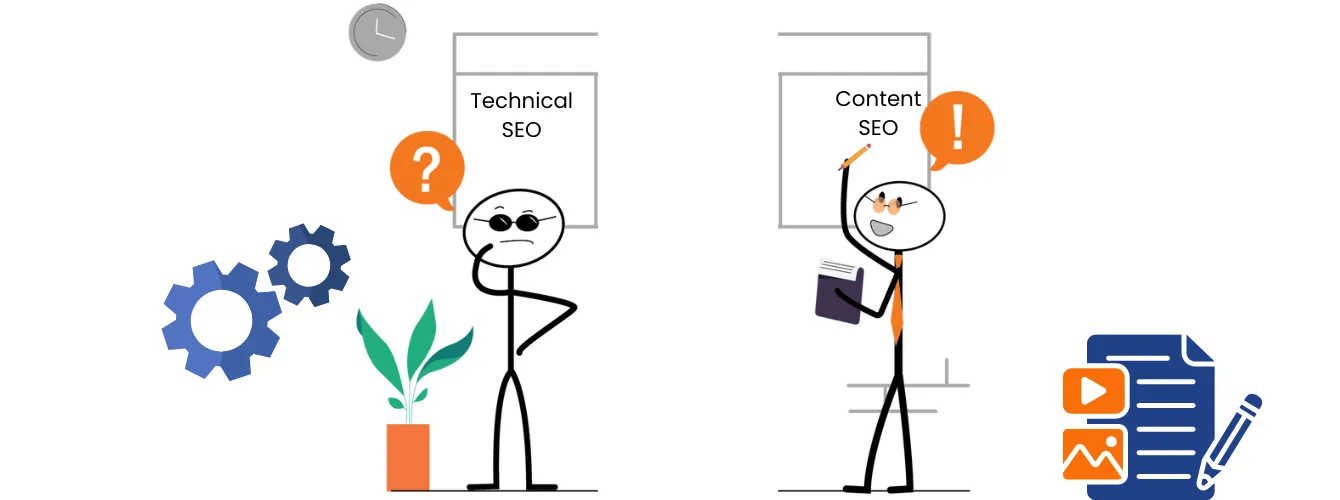Staying ahead of SEO trends is crucial for maintaining a competitive edge. As search engines continue to update their algorithms and user behaviors shift, businesses must adapt their SEO strategies to ensure visibility and relevance. This year, the landscape of SEO is more dynamic than ever, with significant advancements and new challenges emerging.
From the integration of artificial intelligence to the growing importance of mobile-first indexing, understanding these trends can help you optimize your website effectively. In this blog, we’ll delve into the most impactful SEO trends shaping 2024, providing you with the insights and tools needed to enhance your digital marketing strategy. Whether you’re a seasoned marketer or just starting out, this guide will equip you with the knowledge to navigate the complexities of SEO in the coming year.
Current SEO Trends
As we move through 2024, several key trends are emerging that can significantly impact your SEO strategy. From the rise of artificial intelligence in search algorithms to the growing importance of user experience, understanding the SEO trends explained below will help you optimize your website effectively and maintain a competitive edge.
Mobile-First Indexing
Google’s mobile-first indexing means that the mobile version of your website is now considered the primary version for indexing and ranking. With the majority of searches happening on mobile devices, having a mobile-friendly website is crucial. This involves ensuring your site is responsive, loads quickly, and offers a seamless user experience across all devices.
Ways How Mobile-First Indexing Helps in SEO?
To optimize for mobile-first indexing, use tools like Google’s Mobile-Friendly Test to identify and fix any issues. Prioritize fast loading times by compressing images, leveraging browser caching, and minimizing redirects. Additionally, ensure your content is easily readable on smaller screens by using larger fonts and maintaining a clear, simple layout. Simplify navigation to enhance user experience, making it easy for visitors to find what they need quickly. Tools like GTmetrix can help you analyze and optimize page speed and performance, while implementing Accelerated Mobile Pages (AMP) can further enhance loading speed.
AI and Machine Learning
Artificial intelligence (AI) and machine learning are transforming not just SEO but every industry, making search engines smarter and more efficient. Google’s AI-driven algorithms, such as BERT (Bidirectional Encoder Representations from Transformers) and RankBrain, are designed to understand the context of search queries better and deliver more relevant results. BERT, for example, helps Google interpret natural language to match user intent rather than just keywords. Tools like GPT-4 are revolutionizing content creation by generating high-quality, human-like text, aiding in everything from content drafting to keyword research.
How Can AI Help in SEO?
To leverage AI in your SEO strategy, focus on creating high-quality, user-centric content that addresses your audience’s specific needs and questions. Use AI-powered SEO tools to analyze data, identify trends, and optimize content effectively. Additionally, implement AI-driven personalization on your website to enhance user experience and engagement. Tools such as GPT-4 for generating content and ideas, Google Cloud AI for data analysis and predictions, and MarketMuse for content optimization can significantly improve relevance and quality.
Voice Search Optimization
With the increasing popularity of smart speakers and virtual assistants like Alexa, Siri, and Google Assistant, voice search is becoming a significant aspect of SEO. Voice searches tend to be more conversational and question-based, requiring a shift in keyword strategy.
What Should You Do to Optimize My Website for Voice Search?
To optimize for voice search, focus on long-tail keywords and natural language phrases that mimic how people speak. Ensure your website is mobile-friendly and loads quickly, as these factors impact voice search results. Creating detailed FAQ pages that address common questions can also enhance your visibility. Implementing structured data helps search engines understand the context of your content, improving your chances of appearing in voice search results. Lastly, optimize for local search terms, as many voice searches are location-based.
Optimizing for voice search requires considering user intent and mobile-friendliness. Tools like AnswerThePublic can help you identify the common questions and phrases people use in voice searches, allowing you to tailor your content to address those queries directly. Additionally, Google’s Mobile-Friendly Test ensures your website is optimized for mobile devices, a crucial factor since many voice searches happen on smartphones and tablets. By incorporating these elements into your SEO strategy, you can increase your website’s visibility in voice search results.
Core Web Vitals
Core Web Vitals are a set of metrics introduced by Google to measure user experience on your website, focusing on loading performance, interactivity, and visual stability. These metrics include Largest Contentful Paint (LCP), First Input Delay (FID), and Cumulative Layout Shift (CLS). Optimizing for Core Web Vitals is essential for improving your website’s overall performance and user experience.
How to Improve Core Web Vitals (LCP, FID, CLS) for Faster Loading?
To enhance LCP, you should ensure that your main content loads quickly by optimizing images and choosing a reliable, fast hosting service. Reducing FID involves minimizing JavaScript execution time and breaking up long tasks to make your site more interactive. Improving CLS requires reserving space for images and ads to prevent unexpected layout shifts. By compressing and resizing images, deferring non-essential JavaScript, and maintaining stable layouts, you can effectively meet these Core Web Vitals metrics.
Tools and Resources for Core Web Vitals Optimization include PageSpeed Insights for measuring and improving your website’s Core Web Vitals, Lighthouse for auditing performance, accessibility, and SEO, and the Web Vitals Chrome Extension for monitoring Core Web Vitals in real-time while browsing.
E-A-T (Expertise, Authoritativeness, Trustworthiness)
Google places a high emphasis on content quality, especially for topics related to health, finance, and other areas that significantly impact users’ well-being. The E-A-T framework (Expertise, Authoritativeness, Trustworthiness) is crucial for evaluating the credibility of content and its creators.
How to Build Expertise, Authoritativeness, and Trustworthiness (E-A-T) for Your Website?
To enhance your E-A-T, focus on creating well-researched and accurate content authored by experts in your field. Building authority involves acquiring high-quality backlinks from reputable sources and maintaining an active presence in your industry. Establishing trust can be achieved by providing clear, transparent information and keeping your content up-to-date and relevant.
Tools and Resources for Improving E-A-T include SEMrush for identifying high-authority backlink opportunities, Ahrefs for analyzing backlinks and improving domain authority, and Google Scholar for finding credible sources and research to support your content.
Video SEO
Video content continues to grow in popularity, making video SEO a crucial component of digital marketing. To optimize your videos for search, you need to implement several key strategies. This includes using relevant keywords in your video titles, descriptions, and tags, as well as creating engaging thumbnails and providing transcripts for better accessibility. Hosting your videos on platforms like YouTube and Dailymotion can significantly boost visibility, especially since YouTube is the second-largest search engine in the world.
How to Make Your Videos Rank Higher in Search?
It’s also important to ensure that your videos are mobile-friendly and load quickly, as these factors directly impact user experience. Using schema markup can further help search engines understand your video content, improving its chances of appearing in rich snippets. By focusing on these aspects, you can enhance the accessibility, searchability, and overall performance of your video content.
Video SEO Tools and Resources
TubeBuddy helps you optimize your YouTube channel and videos for better search performance. VidIQ provides insights into video performance and offers keyword suggestions to improve your SEO strategy. Lumen5 is useful for creating engaging video content from text articles, helping you convert written content into visually appealing videos.
Local SEO
For small businesses, local SEO is crucial for attracting nearby customers and standing out in local search results. To optimize for local search in 2024, start by claiming and regularly updating your Google My Business listing to keep your information current. Ensuring that your business’s name, address, and phone number (NAP) are consistent across all online platforms is also essential. Actively encourage satisfied customers to leave positive reviews, which can enhance your local visibility.
What are the Best Local SEO Practices to opt for?
To excel in local SEO, use local keywords in your content and meta descriptions to better connect with your community. Create content that addresses local interests and events to boost relevance, and focus on building local backlinks from reputable businesses and organizations to strengthen your authority. Make sure your website is mobile-friendly to meet the needs of mobile users searching for local services.
Effective Tools for Local SEO
Moz Local helps manage and optimize your local business listings, ensuring accuracy across directories. BrightLocal is great for tracking local search rankings and managing reviews. Yext ensures that your NAP information is consistent across various online directories.
Structured Data and Rich Snippets
Structured data, also known as schema markup, is a powerful tool for helping search engines understand the context of your content and can lead to rich snippets that enhance your visibility in search results. Rich snippets, such as review stars, recipe instructions, or event details, provide users with more detailed information upfront, which can significantly improve your click-through rates.
How to Implement Structured Data for Rich Snippets in Search Results?
To effectively implement structured data, begin by using Schema.org markup to highlight important content on your pages. Then, test your structured data with Google’s Rich Results Test to ensure it’s properly set up and eligible for rich snippets. By leveraging structured data, you can boost your chances of standing out in search results and driving more organic traffic to your site.
Effective Tools for Structured Data
Schema.org offers a comprehensive resource for finding and implementing the right schema markup for your content. Google’s Rich Results Test allows you to validate your structured data and check if it’s correctly implemented for rich snippets. Yoast SEO, a popular WordPress plugin, simplifies the process of adding structured data to your website.
Emerging Trends
Several innovative developments are reshaping industries and creating new opportunities. From advancements in artificial intelligence to shifts in consumer behavior, these trends influence how we operate today and set the stage for the future. We’ve listed the most impactful emerging trends in 2024 below that you need to know, understand, and leverage to stay ahead of your competition.
Visual and Image Search
Visual search technology is rapidly advancing, transforming the way users interact with search engines. Platforms like Google Lens and Pinterest Visual Search allow users to search using images instead of text, making visual content optimization increasingly important. Visual search utilizes AI to recognize objects, landmarks, and other visual elements within images, providing users with relevant search results based on their photos.
How to Get Your Images Ready for Visual Search?
To optimize for visual search, ensure your images are high-quality, properly tagged with descriptive filenames, and include alt text that accurately describes the content. Implementing structured data for images can also help search engines understand and index your visual content better. Additionally, create visually rich and engaging content that encourages users to interact and share, further enhancing your visibility in visual search results.
Zero-Click Searches
Zero-click searches are search engine results that provide answers directly on the search results page, eliminating the need for users to click through to a website. These results often appear in featured snippets, knowledge graphs, and other SERP features. While zero-click searches can reduce organic traffic, they also present opportunities for brands to gain visibility and authority.
How Can You Optimize for Zero-Click Searches?
To optimize for zero-click searches, focus on creating concise, informative content that directly answers common questions related to your industry. Use structured data to mark up your content, making it more likely to be featured in rich snippets. Additionally, prioritize answering queries in a clear and straightforward manner, utilizing bullet points, lists, and tables to present information effectively.
Content Experience
The quality of the content experience is becoming a critical factor in SEO success. This trend emphasizes the importance of user experience (UX) and content interactivity, ensuring that visitors not only find your content but also engage with it meaningfully. A positive content experience involves intuitive navigation, fast loading times, engaging multimedia elements, and interactive features that encourage user participation.
What Strategies Improve Content Experience and Increase Dwell Time?
To enhance the content experience, design your website with a user-centric approach, prioritizing ease of use and accessibility. Incorporate multimedia elements such as videos, infographics, and interactive tools that add value and keep users engaged. Regularly update and refresh your content to keep it relevant and appealing to your audience. By focusing on delivering a superior content experience, you can improve user satisfaction, increase dwell time, and boost your SEO performance.
Sustainability and Ethical SEO
Sustainability and ethical SEO practices are gaining traction as businesses and consumers become more environmentally conscious. Sustainable SEO involves optimizing your website and digital marketing strategies in a way that minimizes environmental impact. This can include reducing server loads, optimizing images and videos to decrease energy consumption, and using green hosting providers.
Ethical SEO practices focus on maintaining transparency, honesty, and integrity in your SEO efforts. This means avoiding black-hat techniques like keyword stuffing, cloaking, and buying backlinks, which can lead to penalties and damage your reputation. Instead, prioritize building high-quality content, earning organic backlinks, and providing a positive user experience.
How to Implement Sustainable and Ethical SEO Practices?
To implement sustainable and ethical SEO, conduct regular audits to ensure your practices align with industry standards and best practices. Educate your team about the importance of sustainability and ethical behavior in SEO. By adopting these practices, you not only contribute to a healthier environment but also build trust with your audience and improve your long-term SEO performance.
Conclusion
As we navigate the ever-changing digital landscape, staying informed about SEO trends is crucial. We’ve explored how AI and machine learning are transforming content creation and data analysis, the growing importance of voice search optimization and mobile-first indexing, and how Core Web Vitals, E-A-T, video SEO, local SEO, and structured data all play key roles in your strategy. Additionally, emerging trends like visual and image search, zero-click searches, and a focus on improved content experiences and ethical SEO practices are shaping the future of SEO. Keeping up with these trends and integrating them into your SEO strategy is essential for maintaining and improving your online presence. If you find these insights valuable but need expert assistance to implement them, partner with the best SEO agency to help you achieve your business goals and drive more traffic to your site.







